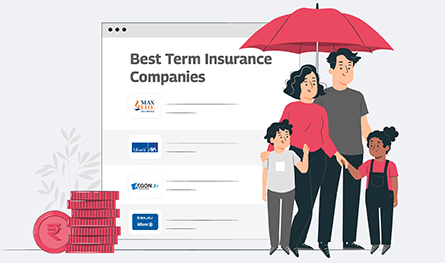How to Choose the Right Car Insurance Policy for Your Vehicle
.jpg)
Purchasing a car or any vehicle can be an exciting event for any Indian family. But sometimes, accidents or other unfortunate events occur too. And we must be prepared to face any such incidents when they occur.
.jpg)
We Indians are more inclined towards saving money, but sometimes being unaware about insurance policies can cost us big time. Protecting your vehicle against any damages or accidents doesn’t just help you save the car. It can also aid you with the costs and coverage. Thus, you must opt for car insurance today if you want your costs covered. But choosing a car insurance policy isn’t as easy as it sounds.
There are a lot of insurance providers in the Indian market. But, to choose a plan, you will have to know how to weigh different plans. This blog will serve the purpose. Here, we will cover everything that you need to know to pick the right insurance plan for your car. We will cover the types of policies, the importance of add-ons and what factors to consider before making a decision. If you find these areas appealing or informative, keep reading.
Types of Car Insurance Policies: Comprehensive vs. Third-Party
Before you can choose what insurance policy to spend on, you must ideally also know about the different types of policies available in the market today. This is not a scary task. When broadly divided, there are two types of car insurance policies that you must know about. The first is third-party insurance plans. And then there are comprehensive insurance policies.
Third-party insurance plans
As the name suggests, third-party insurance plans are plans that are only meant for third parties. This means that such plans are not meant to cover you. Instead, they will cover any damage caused by your vehicle to the property of any third party or the individual himself. This sort of insurance plan is mandatory for everyone under the law and doesn’t extend to the damages that might be caused to you during any accident.
Comprehensive plans
Comprehensive plans will cover both other parties and you. This can be a huge relief since you won’t have to cover your costs out of your pocket. Even though comprehensive plans can be more expensive than the other kind at first, they can help you shrink your costs and expenses in the long term. Thus, don’t forget to compare the pros and cons of both types of plans and their costs before concluding.
Factors to Consider When Choosing the Right Car Insurance Policy
There is no magic trick to find the best car insurance plan. For identifying the policy that suits your needs the best, you will have to do some research. But for starters, the most prominent factors that often come to one’s mind while picking a car insurance plan include the claim settlement ratio, the insurer’s reputation, the costs involved and other features like the no-claim bonus. Let’s now talk about these points in more detail.
Claim settlement ratio
The claim settlement ratio can be extremely important when choosing an insurer. To know for sure whether your insurer will reimburse your claims. You will first have to see if they have a history of honouring their past claims.
For this, the claim settlement ratio can help. You must opt for a certain insurer or their plans only if the claim settlement ratio they offer is high or at least decent. This way, you will be able to ensure that no matter how much damage occurs, your plan will provide you with guaranteed coverage.
Cost and coverage
A good plan doesn’t always have to be costly. Similarly, just because a plan is highly expensive, that doesn’t mean it’s got good coverage and is highly effective. Thus, you should be careful while making the decision. Your choice should be a balance between both cost and coverage. Find yourself a plan that offers great features and yet, you won’t have to break the bank for it.
You might want to opt for affordable car insurance plans at first. But remember, it will cost less at first but might lead to greater expenses later. Long-term coverage and features are the key in this situation.
Scope and exclusions
Some other smaller factors can make a huge difference. In each plan, there are some exclusions mentioned as well. You must be careful while going through the exclusions and the scope since you will not be covered in the event of a listed exclusion. Again, also check the deductibles carefully. These deductibles will determine exactly how much the company will cover and how much you’ll have to pay from your pocket.
No claim bonus
Furthermore, there is also a helpful feature called NCB or No claim bonus in some plans. Try to select a plan that offers such an advantage. This feature is helpful because if, in a year you make no claims, you will be rewarded with lower premiums for it. This helps take some burden off you during premium payments for the said year.
How to Assess Your Vehicle's Insurance Needs
This is totally up to you and how much you want to spend on an insurance policy. But some broad ideas can help you in deciding what plan suits your vehicle the most. This largely depends on what kind of vehicle you own. If it is a brand-new car, it will be wiser for you to invest in a comprehensive plan that can provide you with better coverage, repairs and replacements.
But if it is a rather older model that has already been used for years, it might be a good idea to go for third-party coverage. This will make sure you meet all the mandatory legal requirements and you won’t be spending so much on an old car either.
If you are still unsure about how much premium you can pay, you can also use an insurance premium calculator that can easily make the estimates for you. This will eventually help you choose the plan that you can afford.
Understanding Car Insurance Add-ons: Which Ones Do You Need?
If you think your vehicle is exposed to a certain kind of risk, you can opt for an add-on that will provide your vehicle with suitable coverage for the said risk. Even if your premium will go up depending on how many add-ons you opt for, this can provide great relief in times of need. But what are the most important types of add-ons?
For starters, the zero depreciation cover is a kind of add-on that promises a full claim settlement ratio without considering depreciation or roadside aid. Engine protection can cover an engine failure during a flood and consumables cover the costs of other items like oil and nuts that are skipped by the basic policies. In addition to all the above, the gap insurance add-on covers the gap between the insured declared value and on-road value.
Car insurance policies can be branched into two categories, third-party plans and comprehensive plans. Third-party plans are mandatory by law but cheaper, comprehensive plans are more expensive and are not mandatory but are good for better coverage.
If it’s a newer vehicle, go for a comprehensive plan for better protection. If it’s an older one and you just wish to be legally compliant without spending much, a third-party plan will suit you better.
Your plan type, vehicle’s age and model, deductibles, location, add-ons and a claim-free record can have a good amount of influence on your premium amount.
This bonus allows you to pay less premium for a year in which you have made no claims. It will encourage you to drive safely and reward you for the same.

Author Bio
Paybima Team
Paybima is an Indian insurance aggregator on a mission to make insurance simple for people. Paybima is the Digital arm of the already established and trusted Mahindra Insurance Brokers Ltd., a reputed name in the insurance broking industry with 17 years of experience. Paybima promises you the easy-to-access online platform to buy insurance policies, and also extend their unrelented assistance with all your policy related queries and services.
Other Motor Insurance Products
Latest Post
In a country where medical inflation is rising rapidly, securing a comprehensive health coverage plan for the entire family is no longer optional, it is essential. Selecting the right health insurance requires careful evaluation of multiple factors, not just premium costs. A well-chosen plan ensures financial security, access to quality healthcare, and peace of mind during medical emergencies.


Term insurance is an important investment. However, with the availability of so many insurers offering term plans, it becomes difficult to select the best term plan to suit your needs. Buying a term plan needs some consideration and research on the part of the policyholder. In this post, let us discuss the best term insurance providers in India.


Have you ever caught yourself lost in illusions about your daughter's future events, such as her university convocation and first day at work? Her university convocation. When she embarks upon her initial job after graduation will be the day.

.png)
When you sign up for a life insurance policy - whether it’s a traditional term insurance policy or a ULIP – you are not just buying peace of mind. You are also trusting the insurer with your money. So naturally, you would want to know: How is that money being managed? And more importantly, how is it being protected from risky decisions?

.png)
Globally, 20th October marks the day to observe World Osteoporosis Day. Do you know the significance of observing Osteoporosis on a global platform? Do you know how this condition affects people and their lives? Let us find out in this post!






 Car Insurance
Car Insurance
